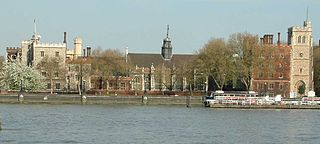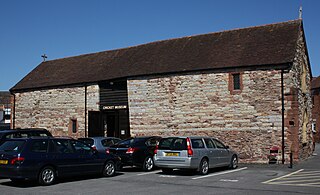Related Research Articles

Boniface of Savoy was a medieval Bishop of Belley in Savoy and Archbishop of Canterbury in England. He was the son of Thomas, Count of Savoy, and owed his initial ecclesiastical posts to his father. Other members of his family were also clergymen, and a brother succeeded his father as count. One niece was married to King Henry III of England and another was married to King Louis IX of France. It was Henry who secured Boniface's election as Archbishop, and throughout his tenure of that office he spent much time on the continent. He clashed with his bishops, with his nephew-by-marriage, and with the papacy, but managed to eliminate the archiepiscopal debt which he had inherited on taking office. During Simon de Montfort's struggle with King Henry, Boniface initially helped Montfort's cause, but later supported the king. After his death in Savoy, his tomb became the object of a cult, and he was eventually beatified in 1839.
William of Wykeham was Bishop of Winchester and Chancellor of England. He founded New College, Oxford, and New College School in 1379, and founded Winchester College in 1382. He was also the clerk of works when much of Windsor Castle was built.
Aymer de Valence was a Bishop of Winchester around 1250.

Richard Poore or Poor was a medieval English bishop best known for his role in the establishment of Salisbury Cathedral and the City of Salisbury, moved from the nearby fortress of Old Sarum. He served as Bishop of Chichester, Bishop of Salisbury and Bishop of Durham.

William Giffard, was the Lord Chancellor of England of William II and Henry I, from 1093 to 1101, and Bishop of Winchester (1100–1129).

Godfrey Giffard was Chancellor of the Exchequer of England, Lord Chancellor of England and Bishop of Worcester.

Henry of Blois, often known as Henry of Winchester, was Abbot of Glastonbury Abbey from 1126, and Bishop of Winchester from 1129 to his death. He was a younger son of Stephen Henry, Count of Blois by Adela of Normandy, daughter of William the Conqueror and Matilda of Flanders. Thus, he was a younger brother of Stephen, King of England, and a grandchild of William the Conqueror. Henry was also a major patron of the arts.

Peter des Roches was bishop of Winchester in the reigns of King John of England and his son Henry III. He was not an Englishman, but rather a native of the Touraine, in north-central France.
Nicholas of Ely was Lord Chancellor of England, Bishop of Worcester, Bishop of Winchester, and Lord High Treasurer in the 13th century.

The Diocese of Bath and Wells is a diocese in the Church of England Province of Canterbury in England.
Herbert Poore or Poor (died 1217) was a medieval English clergyman who held the post of Bishop of Salisbury during the reigns of Richard I and John.

Walkelin was the first Norman bishop of Winchester.

Herbert de Losinga was the first Bishop of Norwich. He founded Norwich Cathedral in 1096 when he was Bishop of Thetford.
John Gervais was a medieval Bishop of Winchester.
Richard de la More was a medieval clergyman who was Bishop-elect of Winchester from 1280 to 1282.
John of Pontoise was a medieval Bishop of Winchester in England.
Mauger was a medieval Bishop of Worcester.
Andrew of London was a medieval Bishop of Winchester elect. He should not be mistaken for his namesake who participated in the siege of Lisbon in 1147.

Taunton Priory, or the Priory of St Peter and St Paul, was an Augustinian house of canons founded c. 1115 by William Gyffarde, Bishop of Winchester and Chancellor of England near Taunton, Somerset, England.
William Barlow was an English Augustinian prior turned bishop of four dioceses, a complex figure of the Protestant Reformation. Aspects of his life await scholarly clarification. Labelled by some a "weathercock reformer", he was in fact a staunch evangelical, an anti-Catholic and collaborator in the Dissolution of the Monasteries and dismantling of church estates; and largely consistent in his approach, apart from an early anti-Lutheran tract and a supposed recantation under Mary I. He was one of the four consecrators and the principal consecrator of Matthew Parker, as archbishop of Canterbury in 1559.
References
- British History Online Bishops of Winchester accessed on 2 November 2007
- British History Online Priors of Winchester accessed on 2 November 2007
